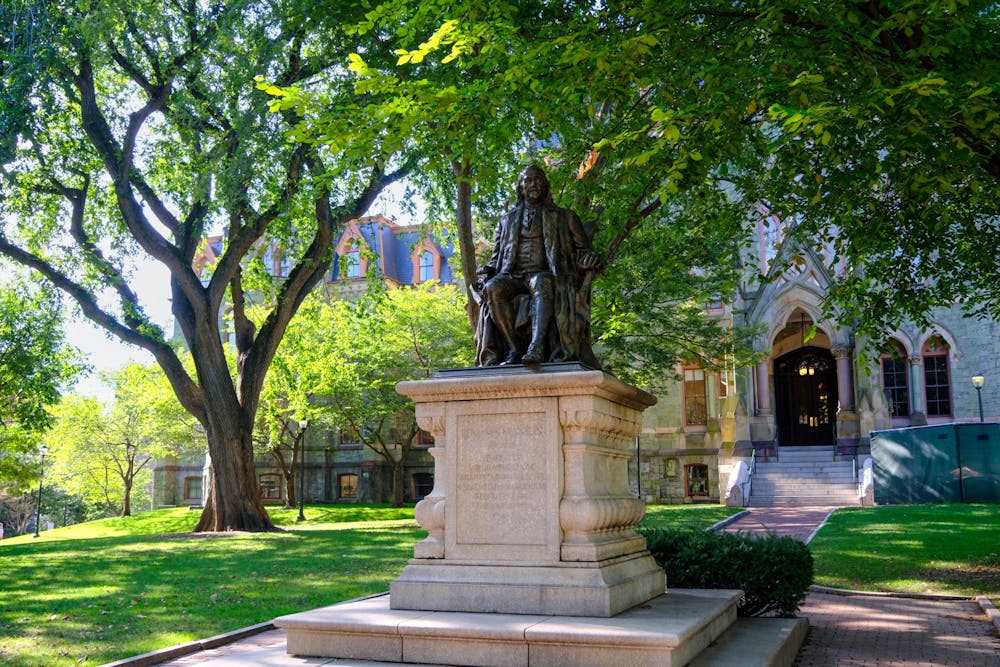36 Penn faculty members signed a letter in support of the Palestine Writes Literature Festival, expressing “deep concern” about a statement from Penn President Liz Magill addressing escalating criticism of the event.
Literature and humanities professors sent the letter to University administrators on Sept. 17, calling for Magill to immediately amend the administrators' statement on the festival so that it clearly supports a diversity of views and communities on campus. The faculty members went on to describe the importance of welcoming a discussion on Palestinian literature and celebrating diversity through the festival.
"Your statement gives the impression that the entire festival could be seen as hosting views that you see as 'incompatible with our institutional values,'" the professors wrote.
Magill, Provost John Jackson, and School of Arts and Sciences Dean Steven Fluharty published the statement on Sept. 12 in response to criticism against the event centered on antisemitic conduct by some of the festival’s speakers. Campus and national groups have said that the speakers' presence threatened the safety and belonging of Jewish students on campus. Jewish groups, Palestinian and Arab affinity groups, and event organizers had mixed reactions to the administrators' statement.
A University spokesperson confirmed that Penn had received the letter, but did not have further comments.
In the letter, faculty members also wrote that Magill’s statement does not make a clear enough "distinction between the affirmation of Palestinian rights, culture, and literature, and the practice of antisemitism.” They said that, as it stands, the statement gives the impression that the entire festival — the goal of which is to celebrate and promote Palestinian literature and art — opposes institutional values.
“It was very wrong, on many levels, of Penn’s administration to suggest that Palestinian literature, culture, and aspirations be conflated with antisemitism," Arabic and Islamic Studies professor Joseph Lowry told The Daily Pennsylvanian.
English and Comparative Literature professor Max Cavitch said that he signed the letter to support the free discussion of the literature of all people and to express disappointment in what he said was Magill’s failure to meet her responsibilities as the steward of Penn's intellectual and societal missions.
RELATED:
36 Penn Faculty | Letter in support of the Palestine Writes Literature Festival
Arab affinity groups, event organizers defend Palestine Writes festival despite Penn statement
“As a Jewish man myself, I find Magill’s vague insinuations of antisemitism both disingenuous and harmful to Penn’s national and international reputation,” Cavitch said. “Worse still, Magill’s comments risk alienating, demoralizing, and even endangering many of our University’s own students and faculty, including those of Palestinian and Arab descent.”
Cavitch said that if Magill were to attend the conference rather than condemning it in advance, "she could learn more about Palestinians’ literary heritage."
In addition to condemning antisemitism, the faculty members condemned Islamophobia and the oppression of Palestinians in the signed letter. They wrote that Magill’s statement could make Palestinian students feel that the University does not support them.
Another signatory of the letter is Roger Allen, the former chair of Penn’s Near Eastern Languages and Civilizations department, who said he was informed of the controversy surrounding the festival by professor Huda Fakhreddine, the current undergraduate department chair and one of the organizers of the festival.
Allen told the DP that the controversy surrounding the festival is demonstrating a larger issue where the phrase "antisemitic" is being used to describe criticism of the Israeli government or support for Palestine.
He said that while the University referenced the controversial statements made by people speaking at the upcoming festival, many have not acknowledged the treatment of Palestinians by Israeli leaders and the Israeli government.
Throughout the five decades that Allen spent teaching at Penn, he said that he has found that Muslim and Arab students at Penn have received minimal support and funding from the University compared to the Jewish community.
Allen said that the phrasing of Magill's statement highlighted a lack of equal support for the two communities because it reflected on the concerns of the Jewish community rather than beginning by stating the community’s obligation to listen to disparate points of view. He added that it seemed as though administrators were being influenced "by one of these two communities at the expense of the other."
The faculty letter also called attention to the significance that literature plays in helping people to engage in critical thought and understand complex issues.
“The arts should be a place where we can explore the challenges," Music professor Carol Muller told the DP. "Perhaps we have lost a sense of the value and work of the arts."
Throughout her time in academia and especially at Penn, Political Science and Comparative Literature professor Anne Norton said she has witnessed as Palestinians have been subjected to discrimination, silencing, policing, and denigration.
“I hope that students and faculty will do what the administration has failed to do: Defend Palestinians at Penn, secure their right to speak, and make their culture, their writing, and their struggles visible,” Norton said.









